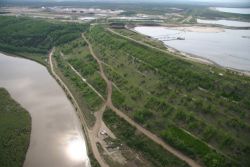Around this time last year, when faced by growing concern about toxic oilsands tailings ponds, Albertans were assured by their oilsands regulator that the new rules on tailings production meant business.
"All projects will meet ERCB tailings standards if they want to operate in Alberta," said a spokesperson for the Energy and Resources Conservation Board (ERCB). This week it was confirmed that this is a far cry from the truth when we received a response from the ERCB declaring it has the power to exempt oilsands operators from meeting its regulatory standards.
The ERCB's declaration came in response to a review application submitted in August by Ecojustice, on behalf of the Pembina Institute and Water Matters. The application asked the ERCB to review and rescind approval of tailings management plans for Syncrude's Mildred Lake and Aurora North oilsands projects, plans that don't comply with the requirements of the ERCB's new tailings rules. We argued that the ERCB did not have the legal authority to approve non-compliant plans.
The ERCB said in its decision that it has the power to "exempt from its own regulatory requirements" and that it would not review the Syncrude approvals. The ERCB went on to say that "imposition of the tailings management requirements may have significant impacts to existing and prospective oilsands mining operations." Well, yes, wasn't that the point?
 Why the flip-flop? It wasn't as though industry wasn't consulted. We've heard from the ERCB spokesperson that, "The directive was passed last February after pretty extensive consultation. . . . We went over it to see if there were any deal-breakers, anything that the companies would be unable to comply with, so the final directive was something the companies would be able to comply with."
Why the flip-flop? It wasn't as though industry wasn't consulted. We've heard from the ERCB spokesperson that, "The directive was passed last February after pretty extensive consultation. . . . We went over it to see if there were any deal-breakers, anything that the companies would be unable to comply with, so the final directive was something the companies would be able to comply with."
And it's not as if public interest or scrutiny has softened. Indeed, the October duck deaths are keeping oilsands and the impacts of tailings waste in the international spotlight. The directive even had the backing of Alberta Premier Ed Stelmach who declared on Earth Day that his government would force an end to oilsands tailings ponds.
The directive says tailings must be cut by 20 per cent between now and 2011, 30 per cent between 2011 and 2012 and 50 per cent between 2012 and 2013. So far the ERCB has approved plans for Syncrude's Mildred Lake and Aurora oilsands mines that do not meet the requirements until 2014. Imperial Oil's Kearl oilsands tailings plan was also approved and it does not appear to be compliant with the directive until 2018. Why these companies are allowed these generous exceptions is not clear. The ERCB has provided only vague reasons as to why the regulations are now optional.
This leaves us scratching our heads in frustration and questioning whether the ERCB is prioritizing the needs of industry versus its public interest mandate, a mandate that is supposed to ensure that the discovery, development and delivery of Alberta's energy resources takes place in a manner that is fair and responsible. And, as Ecojustice has noted, "a fundamental principle of law is that the law applies equally to everyone, and administrative decision-makers cannot decide who to exempt from the law." In this case, this principle does not apply to those companies that are able to negotiate (in private) the most generous extensions.
Meanwhile, Alberta regulators continue to spend taxpayer dollars on public relations efforts here and abroad stating that there are "strict regulations to protect land, water, air, wildlife and people." Tailings ponds currently cover 170 square kilometres and the regulations clearly aren't "strict" - they're flexible.
The ERCB is continuing its reviews of the three remaining tailings plans, submitted by Shell for the Jackpine and Muskeg River projects and by Canadian Natural Resources Limited for its Horizon project. Since addressing tailings is not an insurmountable technical challenge, these plans could meet the tailings directive — now it's just a question of whether they'll be forced to. Cleaning up this liability and moving to better tailings practices is a reasonable cost of doing business in a multibillion dollar industry.








